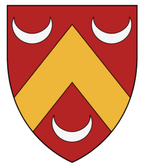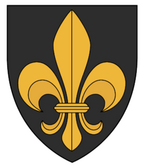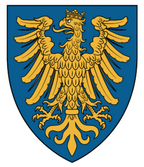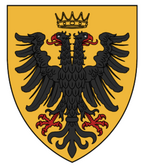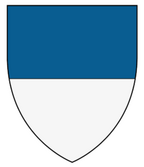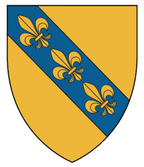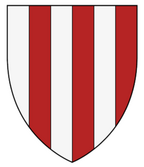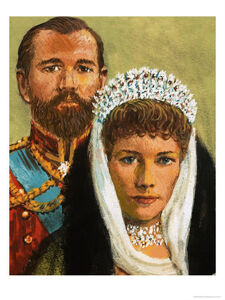
The Ruthenian Nobility is one of the most old and rigorous system in the history , unlike other countries , the noble titles granted in Ruthenia are considered sacred as important, this due to the custom of the empire is unified in the single figure of the emperor and other charges are supervised and given to his will.
In the empire, the charges and nobility are separated into three major features: dignities ,offices and titles, only the last could acquire land and nobility titles and these titles have weight not only public opinion , but also be closer to the imperial family, obtaining such noble titles was quite rigorous and only conferred to those ancient families who served for generations to the imperial family or the rule itself, others were won by prowess and great military campaigns , so during the reign of Ruthenia were created two titles : the military and civilians titles, although the first is always obtenian for favors , the latter were more appreciated by meritocracy and efficiency in the imperial administration.
Overview[]

Isaakios Batatzes, one of the few "old" Ruthenian noble families
The Ruthenian Empire has a complex and bureaucratic system of titles of nobility as fees both to honor civilians and nobles determined to serve the nation, on the one hand, a system of lineages and inherited titles of nobility of the ancient Kingdom of Rúma (according to ancient historians, The Kingdom of Saint Stephanos had 40 duchies and 112 counties before the fall of Beretea), after the fall of the kingdom against the Parsian Empire, the Sultan of Parsia created a complex system of imperial administration inherited dignities and offices of court, according to the administrative performance could climb in the long list of charges that the empire had, those charges came in every way, from the chamberlain to the holder cups emperor, this complex system caused great confusion as the flow of offices and dignities was huge and many did not even know how many offices and dignities had.
In the eyes of these ancient nobles, only the king of Rúma could take their titles of nobility besides the abolition of their kingdom and the Parsian Sultan well understood, after the death of the Last Rúmelian King, The Sultan took away the noble Selloi and Maurian all possessions and properties, keeping their noble titles and being only "name", being humiliated in the process, all those nobles only 6 are at present, including the current imperial family, these families are Daskalaris, Batatzes, Komnenos, Kantakouzenos, Argyros, Doukas and Botaniates.
The Parsian Sultan never bothered to change or abolish titles of nobility of the Rúmelian survivors,the remaining nobles kept intact as a "memory of shame of his kingdom defeated" because mostly of nobles only had the name and lineage that backed, consequently, most sold their hereditary rights and titles in return for a better life to the Parsian aristocracy, other survived thanks to their huge fortunes and many of them (like Philaras or Daskalaris) helped in the formation of the revolutionary army and the formation of Enosis centuries later , others donated money to charities and the church to preserve free all they had in the years of slavery : the Orthodox Church
The Pronoia[]
After the fall of Parsian Empire the Ruthenian empire inherited the confusing system of the former empire, and many called maintain such offices and dignities to maintain imperial tradition inherited from their ancestors, the Basileus also considered it relevant as a means of maintaining and separate the noble lines of the imperial family, with the support of the church, the Basileus created various reforms in order to optimize and abolish certain nobility titles and with the aim of updating and deleting legacy obsolete positions, abolished a lot of administrative positions and created others, kept the noble titles and abolished others, finally, improved both administrative and efficiency to every level of nobility both military and civil offices, such reform is called "The Pronoia"
The Pronoia consesión consisted of the administrative offices and honorary character dignities according to his office and position in the imperial court, could lose it in different ways to change certain concessions, these charges are given for prizes and exclusive rights without violating imperial authority, reformed prize dignities and offices in honorific titles also reformed the importance of titles of nobility and power today, creating a complex system itself but more clean for administrative issues. The Pronoia is inspired by both Rúmelian customs and ideas of Aquitanian federalism maintaining certain habits of the Parsian as dignities and offices and all the solemnity that that entails.
The Pronoia helped curb the powers of dignities, being true nobility powers to mere prizes and concessions, administrative titles or offices with a particular inherited powers honorary title for his work, strengthening the power of the imperial nobility and other noble houses which were also created new positions and a true and renewed imperial court based in neighboring countries (barony, county, vizcounty, march and duchy) and all subordinate to the imperial power chosen by the Ecumenical Patriarch of the church
Dignities[]
Main Article: Ruthenian Aristocracy and Bureaucracy
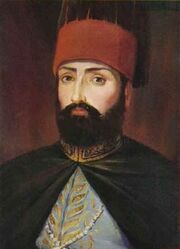
Some nobles use Berets, Capes, Shoes or Belts of recognition his dignities
The dignities (or axió̱mata in Hellenic) are conferred by merely honorific titles that epitomize the person and his family, these dignities were received as prizes in performing certain favors or as a mere title by performing certain tasks in both the civil and military administration , dignities gave certain rights , such as the use of a color of clothing or the use of certain garments (hats , medals and poles) and the right of access to civil and imperial units, some dignities are used to claim to abiding aliens empire and some foreign cities, although the dignities in the formal sense is just a title with no content, people feel honored that the basileus remind and bestow such awards as rewards also gives a different standard because it means I considered by the imperial family for certain tasks imperial interest, After the reform pronoia, certain dignities are assigned according to administrative charges that were assigned (eg, the dignity of "Sevasmios" only given to diplomats from allied countries of the empire), such dignities are a garnish the office he holds and represents the importance of the person in that position, only those assigned by the Basileus can carry these dignities and lose when they lose their charge, the dignities can be given to the military or the civilians
Such dignities are necessary, according to the administrative system of the empire, to motivate and give more exercise to both domestic tasks as executive of the imperial government, causing a giant aristocracy in the imperial court of the Basileus behind in search of favors and consultations, with Konstantinos the pronoia reform banned unnecessary inherited dignities of the old empire and forced Parsian dignities granted only when they are deserving and under strict supervision. The dignities can be removed by Basileus will if you not meet certain actions that you were granted or if you have lost the imperial confidence to perform tasks you were assigned, even if you lost the imperial confidence (If commit a crime within the empire, justice understood to have lost the confidence of the emperor because you attempted against the will of empire and lose all your dignity acquired)
Offices[]
The offices (or synallagés in Greek) and honorary positions are those positions granted by the utmost confidence that has the imperial family for specific and important responsibilities , are also considered " places of honor " among which are awarded , these trades are related to work both domestic and external to the imperial family and may be limited , unlike the dignities , trades can be inherited and obtained certain Concessions in the empire , after the reform of the Pronoia , improved imperial Concessions and created more jobs but limited its use to domestic purposes only ,trades for Rúmelian thought is a responsibility that the emperor will not only conferred certain task , but you must take this task with responsibility , unlike dignities, they are considered a burden and take greater control of the imperial family and their lack is " disrespectful to the whole empire". the offices only given to the civilians such offices may be alternative positions with imperial and noble titles , but not with the dignities , are granted to ordinary citizens as a means of social advancement for its good work ( for example, access to the Senate or the army ), such dignities are difference by medals and other decorations granted by the emperor , besides the title that should take care before and / or name.
These offices and honorary titles can be removed at will by the Basileus, these titles are few and suffering a constant rotation depending on the ruling administration, the Basileus can create other titles and offices as it deems appropriate for the administration of the empire, under discussion in the parliament and advice from other the emperor considers relevant
Nobility[]
Titles of nobility (exev̱genisméno) in the empire have a different origin than other countries, there two tipes of nobles in Ruthenia:
- Amni̱mónef̱tos (αμνημόνευτος or Inmemorial Nobility in English) it is considered noble to those families or survivors those ancient dynasties and dynasties that have survived despite the time, in its restrictive sense , refers to the noble families whose origins can be traced from the fall of the Romania Kingdom. In its most inclusive sense and more generally accepted , refers to holders of feudal nobility who can trace their uninterrupted possession of nobility rights to time immemorial.
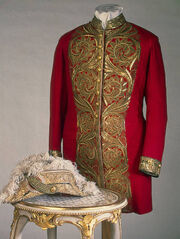
Ceremonial Garments of Ruthenian Nobles
In many older dinasties between realms are considered primus inter pares, enjoy this range instead by a Imperial decree, but by the exercise of the privileges pop aristocracy since time immemorial, making it unnecessary to establish the circumstances of the original grant , some say that would be the time immemorial before the fall of Beretea era, others from even earlier, the Pronoia set all time records before Beretea was considered " time immemorial " , all subsequent titles created either by will or decree imperial nobles were considered from a certain time.
- archontiá tou pronomíou (αρχοντιά του προνομίου or Nobility for Privilege in English)which gave the monarch of each nation or state as a reward for services to the State or glorious actions, which may be personal or transmissible. Personal granted only when a subject to enjoy it while alive and disappears with his death. Transmissible when possession is for the person to whom it is given and to their descendants so that passes all grades straight from male to male. During the Parsian Era almost no one gives a nobiliary title and all the Parsian titles was abolished. but the Pronoia reform revive some nobles (as Kontostephanos for example) in minor titles, the only exception is the Daskalaris, the actual imperial family, is grandfather was given the title of doux by Yasif II, a Parsian Sultan, but he defend his Selloi heritage arguing that in turn descended from an extinct family: Laskaris, and your blood carries blood as immemorial privilege, using the first as an argument to his ascension to the throne.
After the reform, the Basileus constituted significant differences in order to obtain a fair climb and the en privileges between nobles and civilians will be more subdued , arguing that in the eyes of the Basileus, are all subjects, the Pronoia brought several changes such as the elimination of " nobility " and " gentry " existing in other nations, there were only certain nobles and those nobles either by immemorial privilege or primus inter pares among them were treated , ( it is understood that the lower nobility is reflected in the imperial offices, but the Basileus gives another approach and less durable, trades are not inherited or earned their profits nobles )
Granted various benefits , as only the nobles , regardless of their origin , they can belong to the Senate and posts sum imperial importance , plus certain rights , but forced those nobles equitable treatment among nobility civilians, to prevent further discrimination, only will be treated as a noble who treat all people as equals , in addition to exemption from certain taxes and immunity from misdemeanors, but all nobles , regardless of origin, must work in various positions to remain , at present these nobles amass great fortunes that many of its members should not work , but if you pay for your maintenance these changes forced the nobility to accept imperialism formed by the new dynasty and the changes brought greater efficiency and effectiveness in administrative work, the changes promised pronoia culturally but greater equality between nobles and employees and force the nobles to comply imperial orders to maintain their privileges
Differences with foreign nobility[]
- the Ruthenian nobility is forbidden to have a coat of arms, heraldry or any symbol that represents his dynasty, for theological reasons: the Orthodox Church considers any worship other than religious symbols as heresy and the Ruthenian culture has the task of protecting the Orthodox values, the only dynasty that can have that privilege is the imperial family, whose family and personal symbol their own symbolism and colors, which are accepted by the church because they are also considered sacred symbols (cross and double headed eagle by example) Nobles that do use other items such as clothes, accessories, boots and even costumes representing their dynasties, besides the registry has a respect for the noble surnames, can not be taken by civil or changed and it is understood that such is their surnames support and represent their noble origins (a civilian can not be changed unless a surname noble is adopted by this and if the noble surname change is understood to have waived its origins and loses its nobility benefits) That is why certain names in Ruthenia are considered nobility and when a citizen has them is considered noble as Daskalaris, Doukas and Kantakouzenos among others.
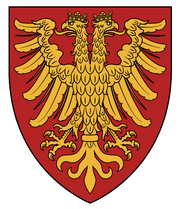
Kantakouzenos Coat of Arms, the family only can use his heraldry outside the empire.
However, many noble families have coat of arms and other prohibited badges within the empire but used for diplomatic purposes or other foreign families know their noble origin, outside the imperial boundaries is not prohibited from using coat of arms, the heraldic shields and stand out for their religious inspirations and similarities between them (probably because almost every family "immemorial" are related between them)
- Ruthenian nobles can only hold public office need it the emperor and not give them land titles and tax benefits, just give them benefits fees in certain communities may apply for various public offices they want, but they have secured their promotion, that they can maintain their property and fortunes and manage as they wish, their noble titles only mean "their ancient heritage" as former citizens of Ruthenia, but in the eyes of the Basileus are subjects only and as such must comply with the orders and serve according to existing imperial laws
- Unlike other nations, the nobility titles are more limited, limiting itself to the title of "duke, earl, marquis, and baron" other titles are considered imperial offices or dignities or simply do not exist and all titles, regardless of weight, are equal voice and vote in certain circumstances, in the end, only the Basileus has the final word all of the above titles are in Hellenic and are known in Hellenic and in other nations they note
Charges and Noble Titles[]
Main Article: List of Noble Titles in Ruthenian Empire
Despite its nominal importance within the administrative hierarchy of the empire, because they have no actual territorial possession, these titles are manifested in forms of treatment, social importance and closeness to the imperial family, such titles are:
- Megadoux(μέγας δούκας or Grand Duke), its the equivalent for the foreign Grand Duke, the Megadoux is the most important noble title in all the empire and only exists three Megadoux, the title is granted to his family members like sons and grandsons as honorary titles.
- Doux(δούκας or Duke in english) the equivalent to the foreign duke is the Doux, this title is given to more aristocratic and influential families and gives more political influence, they usually have large fortunes and their relatives are related among them, even in far way with the Imperial Family, there are 6 Doux in all the empire, the most notable family was the Doukas famiy, considered themselves the first doux of Ruthenian Empire.
- Kómis (κόμης or Earl in English) Its origin is in the committees ("companions of the Emperor") of the Kingdom of Rúma ,but with more afinity to the imperial court for his importance, given to military ranks, this title is given to exiliated familiars or some ambassadors, there are 17 Komis in the empire, almost everyone Maurians or Sarbians in the frontiers of the empire.
- Kleisourarka (μαρκήσιος or Marquis in English) its a noble and honorary title with characteristics similar to the counts, they had a political-administrative charge with military functions, especially in the defense of the frontiers. after the Pronoia this title is only simbolical and allows them certain facilities for promotion of public office, there are 25 Kleisourarkas in the empire.
- Varonos (βαρώνος or Baron in English) is a title of honour, and ranked as one of the lowest titles in the various nobiliary systems, its considered a title of courtesy inside the nobiliary system, there more a 40 Varonos in the empire but their influence is minimal, retains a purely social prestige, with no particular political privileges
Other Noble Titles[]
- Ypokomis (υποκόμη or Vizcount) its a komis who replaces the count in his absence, usually gives to familiars of Komis.
Peerage (Zévgos)[]
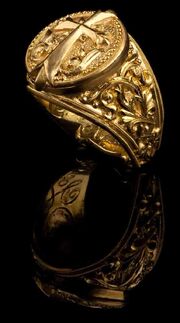
A Zévgos Ring
The Peerage is a titles system that regulates the granting of nobility and dignity in the empire. Is know as the requirement of attending Parliament was at once a liability and a privilege to come, meet, review and vote on certain decisions in parliament.
The Zévgos ts a more personal title rather than territorial. while the baronies titles are considered "territorial" the peerages are considered personal securities expressed in those dignities or personal offices of each, the Varonos title had always been hereditable by an eldest son under primogeniture, but on condition of payment of a fine, termed "relief", derived from the Latin verb levo to lift up, meaning a "re-elevation" to a former position of honour.
The Zévgos can be worn some rings and clothes (a red tunics) that identify them as members of parliament and Zévgos
Notable Noble Houses[]
There are numerous houses of Maurian, Selloi and Sarbian origins.
Selloi Noble Houses[]
- Daskalaris
- Batatzes
- Doukas
- Komnenos
- Botaniates
- Argyros
- Kantakouzenos
- Akropolites
- Agelatsos
- Asanes
- Axouchos
- Blastos
- Blatteros
- Branas
- Bryennios
- Choumnos
- Philaras
- Contrizakis
- Dalassenos
- Dassiotes
- Dermokaitis
- Euphorbenos
- Kontostephanos
- Kourkouas
- Lekapenos
- Melissenos
- Metaxas
- Metochites
- Mikroulaches
- Mouzalon
- Notaras
- Phrangopoulos
- Rhangabis
- Synadinos
- Tarchaniotes
- Taronites
- Tornikes
Maurian Noble Houses[]
- Aleramici
- Donato
- Bragationi
- Gattilusio
- Gagliardi
- Sanado
- Crispo
- Buondelmonti
- Toccali
- Orsini
- Zorzi
- Pallavicini
- Binicola
- Ghetaldi
- Gondola
- Luccari
- Pozza
- Zamagna
Sarbian Noble House[]
- Altomanovic
Coat of Arms Gallery[]
| ||||||||||||||||||||||||||||||||||||














